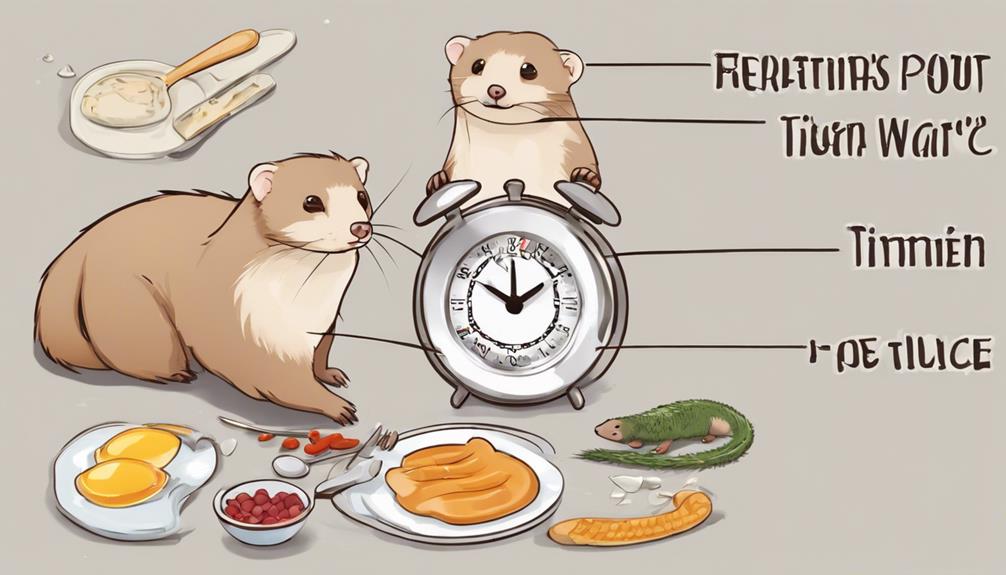When to Feed Your Ferret for Optimal Health

Feeding ferrets properly is essential for their health and well-being. Here are some best practices to follow:
- Meal Timing:
- Ferrets are obligate carnivores and should be fed a high-protein diet.
- Feed adult ferrets 1-2 times a day, ideally in the morning and evening.
- Portion Control:
- Avoid overfeeding to prevent obesity.
- Follow the recommended portion sizes based on your ferret's age and weight.
- Snack Options:
- Offer occasional treats like cooked egg, small pieces of fruits, or commercial ferret treats.
- Avoid giving sugary or fatty treats excessively to maintain a balanced diet.
By following these feeding practices, you can ensure that your ferret stays healthy and happy.
Daily Feeding Schedule
When creating a daily feeding schedule for your ferret, it's crucial to establish a consistent routine that aligns with their dietary needs and preferences. Ferrets have specific feeding habits that need to be taken into consideration to ensure they receive adequate nutrition. These playful and curious animals are obligate carnivores, meaning they require a diet high in animal protein and fat. It's essential to provide them with a balanced diet that meets their nutritional needs to support their overall health and well-being.
Understanding your ferret's feeding habits is key to developing a feeding schedule that works best for them. Ferrets are known to have a high metabolism, so they need to eat small, frequent meals throughout the day. Offering them a diet rich in high-quality ferret food and occasional treats will help maintain their energy levels and prevent any nutritional deficiencies. By catering to their nutritional needs and feeding habits, you can ensure that your ferret stays healthy and happy.
Ideal Feeding Times

Ferrets thrive on a consistent feeding schedule, with meals ideally spaced throughout the day. The frequency of feeding should align with the ferret's natural eating habits, ensuring they receive the necessary nutrients.
Understanding the ideal feeding times can contribute significantly to your ferret's overall health and well-being.
Timing for Meals
Establishing a consistent schedule for meal times is crucial in maintaining the health and well-being of your ferret. Feeding frequency and meal timing play vital roles in ensuring your ferret's nutritional needs are met.
It's recommended to feed adult ferrets 1-2 times a day, ideally in the morning and evening, to mimic their natural feeding patterns. Young kits require more frequent feeding, about 3-4 times a day, due to their higher energy levels and growth demands.
Frequency of Feeding
To ensure optimal health for your ferret, maintaining a consistent feeding schedule is essential. Ideal feeding times are in the morning and evening for adult ferrets. Feeding intervals should align with your ferret's nutritional needs and feeding habits.
Adult ferrets typically require two meals a day, spaced approximately 12 hours apart. Meal planning is crucial to prevent overfeeding or underfeeding. It's recommended to offer a high-quality, protein-rich diet specifically formulated for ferrets.
Observing your ferret's eating patterns and adjusting portion sizes accordingly is key to promoting a healthy weight and preventing nutritional deficiencies. By establishing a routine and monitoring your ferret's intake, you can ensure they receive the proper nourishment to thrive.
Portion Control Guidelines

For optimal health, ensure that your ferret's diet is carefully portioned to meet their nutritional needs. Understanding your ferret's feeding habits is crucial in determining the right portion sizes. Ferrets are obligate carnivores, meaning their diet should primarily consist of animal proteins and fats.
When considering their nutritional needs, it's important to focus on high-quality ferret food that's rich in animal-based ingredients rather than plant-based fillers. Portion control is essential to prevent obesity, which can lead to various health issues in ferrets.
A general guideline is to provide about one-quarter to one-third cup of dry kibble per day, split into two meals. Adjust the portion size based on your ferret's activity level, age, and overall health. It's advisable to consult with a veterinarian to determine the ideal portion sizes for your individual ferret.
Meal Frequency Recommendations

When considering the optimal health of a ferret, the frequency of meals plays a crucial role.
The amount per feeding, along with the consistency in timing, are key factors to keep in mind.
Establishing a structured feeding schedule helps maintain the ferret's health and well-being.
Feeding Schedule Importance
With ferrets being small carnivorous mammals, their feeding schedule plays a crucial role in maintaining their optimal health and well-being. Consistency in feeding and meeting their specific dietary needs is essential for ensuring a healthy ferret. Here are four key points to consider for an effective feeding schedule:
- Regular Feeding Times: Establish fixed feeding times to regulate their metabolism and prevent overeating.
- Balanced Nutrition: Ensure each meal provides the necessary balance of proteins, fats, and carbohydrates to meet their dietary requirements.
- Meal Planning: Plan meals ahead to avoid sudden changes that can upset their digestive system.
- Hydration: Always have fresh water available to keep your ferret hydrated and support their overall health.
Maintaining a structured feeding schedule is vital for promoting the well-being of your ferret.
Amount per Feeding
Establishing the appropriate amount per feeding is crucial in determining the optimal meal frequency for your ferret's health and nutrition. Feeding intervals should be spaced out appropriately to avoid overfeeding or underfeeding. It is recommended to feed adult ferrets 1/4 to 1/2 cup of high-quality ferret food per meal, 2-3 times per day. For baby ferrets, they may need to be fed more frequently to meet their higher energy requirements. Ensuring nutritional balance in each feeding is essential for your ferret's overall well-being. Meal timing should be consistent to regulate your ferret's metabolism and digestive system. Below is a simple guide for feeding intervals and portion sizes:
| Age Group | Meal Frequency | Portion Size |
|---|---|---|
| Adult | 2-3 times/day | 1/4 – 1/2 cup |
| Baby | 4 times/day | 1-2 tbsp |
Consistency in Timing
For optimal health and nutrition, ensuring consistency in meal timing is essential for your ferret's well-being. Maintaining a regular feeding schedule can provide numerous health benefits, especially concerning digestive health. Here are four key points to consider when establishing a consistent meal timing routine for your ferret:
- Establish a Routine: Set specific times for feeding each day to create a predictable schedule for your ferret.
- Avoid Frequent Changes: Stick to the established meal times to help regulate your ferret's digestive system.
- Monitor Appetite: Keep an eye on your ferret's appetite to ensure they're eating regularly and adequately.
- Consult a Vet: If unsure about the best meal timing schedule for your ferret, consult with a veterinarian for professional advice.
Snack Options for Ferrets

When selecting snacks for ferrets, prioritize options that are high in protein and low in carbohydrates to maintain their health and well-being. Ferrets have specific dietary needs, and offering appropriate snacks can contribute to their overall nutritional balance. Here are some treat options and feeding frequency suggestions to help you make the best snack choices for your furry friends:
| Treat Options | Feeding Frequency |
|---|---|
| Cooked Meat | 1-2 times a week |
| Egg | Once a week |
| Freeze-Dried Meat | 2-3 times a week |
| Ferret-Specific Treats | Occasionally |
When giving snacks to your ferret, ensure they are getting a balanced diet and not just indulging in treats. Moderation is key to maintaining their health and preventing obesity. By offering snacks rich in protein and limiting carbohydrates, you can keep your ferret healthy and happy. Remember, snacks should complement their main diet, not replace it.
Importance of Water Intake

Ensuring an adequate intake of water is crucial for maintaining the health and well-being of your ferret. Hydration importance can't be overstated when it comes to ferrets, as water plays a vital role in various bodily functions.
Here are some key points to understand the significance of water intake for your ferret:
- Prevention of Dehydration: Adequate water intake helps prevent dehydration, which can lead to serious health issues.
- Temperature Regulation: Water helps regulate your ferret's body temperature, especially important for these animals that are susceptible to heat stress.
- Digestive Health: Sufficient water intake aids in digestion, preventing issues like constipation and bloating.
- Overall Well-being: Proper hydration ensures your ferret stays active, healthy, and maintains a shiny coat, contributing to their overall well-being.
Monitoring Your Ferret's Eating Habits

Maintaining optimal health for your ferret involves closely observing and monitoring its eating habits to ensure proper nutrition and well-being. Behavior changes in your ferret's eating patterns can indicate underlying health issues or discomfort. It's essential to monitor portion sizes to prevent overeating, which can lead to obesity and related health problems. By keeping track of your ferret's weight and adjusting portion sizes accordingly, you can help with weight management and overall health.
Additionally, paying attention to your ferret's food preferences is crucial. Ferrets may have individual likes and dislikes when it comes to food, and being aware of these preferences can help ensure they're getting the nutrients they need. If you notice significant changes in your ferret's eating habits or if they suddenly stop eating, it's vital to consult with a veterinarian promptly to address any potential health concerns. Regularly monitoring your ferret's eating habits and making necessary adjustments can contribute significantly to their overall well-being.
Frequently Asked Questions
Can Ferrets Eat Fruits and Vegetables as Snacks?
In the world of ferrets, munching on fruits and veggies can be a delightful and nutritious treat. It's important to maintain a nutritional balance, watch portion sizes, and consider digestive health to keep them thriving.
How Can I Tell if My Ferret Is Eating Too Much or Too Little?
To monitor a ferret's eating habits, observe mealtime behavior, establish a feeding schedule, and practice portion control. Regularly weigh the ferret to track changes. Too much or too little eating can indicate health issues, so consult a vet.
Are There Any Specific Treats That Are Harmful to Ferrets?
When choosing treats for ferrets, it's crucial to avoid toxic ones like chocolate, raisins, and sugary snacks. Safe alternatives include cooked meats, eggs, and small pieces of fruits or vegetables. Always prioritize your ferret's health and well-being.
Is It Okay to Mix Different Types of Ferret Food Together in One Meal?
Mixing different types of ferret food in one meal can upset their digestive health. It's crucial to maintain nutritional balance for optimal health. When meal planning, stick to one type of food to ensure proper digestion and overall well-being.
How Do I Transition My Ferret to a New Diet Without Causing Digestive Issues?
Transitioning a ferret to a new diet requires patience. Slowly introduce the new food alongside the old, gradually increasing the new portion. This gentle approach helps prevent digestive issues and allows the ferret to adapt comfortably.











